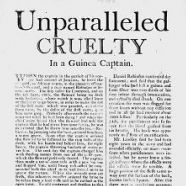 Oxford reseachers now have access to the digitised Deutsche Reichsanzeiger und Preußischer Staatsanzeiger 1819-1945. It is listed in Databases A-Z and will soon also appear in SOLO.
Oxford reseachers now have access to the digitised Deutsche Reichsanzeiger und Preußischer Staatsanzeiger 1819-1945. It is listed in Databases A-Z and will soon also appear in SOLO.
The Deutsche Reichsanzeiger and Preußische Staatsanzeiger was a newspaper that appeared until April 1945 and acted as the official press organ of the state of Prussia and then the German Reich. The history of the newspaper goes back to 2 January 1819, changing title and scope in the course of time. Included in this online resource are:
- Allgemeine Preußische Staats-Zeitung, 1819 (1) (2 January) – 1843 (179) (30 June)
- Allgemeine Preußische Zeitung, 1843 (1) (1 July) – 1848 (119) (30 April)
- Preußischer Staats-Anzeiger, 1848 (1) (1/3 May) – 1851 (179) (30 June)
- Königlich Preußischer Staats-Anzeiger, 1851 (1) (1 July) – 1871 (116) (2 May)
- Deutscher Reichs-Anzeiger und Königlich Preußischer Staats-Anzeiger, 1871 (1) (4 May) – 1918 (267) (9 November)
- Deutscher Reichsanzeiger und Preußischer Staatsanzeiger, 1918 (268) (12 November) – 1945 (49) (14 April)
The content also changed over time. Alongside interesting government-controlled editorial sections, the value of this resource lies in an enormous treasure of orderly gathered microdata. While the gazette published official government notices, in the course of the second half of the 19th century it also published details relating to trade and commerce (e.g. bankruptcies) and between 1873 and Deb 1943 also stock market information.

Königlich Preußischer Staats-Anzeiger, no. 3, 4 January 1871
This resource will also be of interest to those engaged in genealogical studies in Germany in as far as it published extensive lists of casualties during the First World War and expatriation lists during the Third Reich.

Deutscher Reichs-Anzeiger und Königlich Preußischer Staats-Anzeiger, no 137, 13 June 1916
The text is in German Gothic script. You can zoom in and out to enlarge the text and easily create a snippet image to save or print out. Full-text searching is possible also.
Also of interest:
- Kling, Christoph, Deutscher Reichsanzeiger und Preußischer Staatsanzeiger : Einleitung zur Veröffentlichung der Digitalausgabe. (Mannheim, 2016) [Report]
- Hepp, Michael; Lehmann, Hans Georg, Die Ausbürgerung deutscher Staatsangehöriger 1933-45 nach den im Reichsanzeiger veröffentlichten Listen. 3 vols. (München : Saur, 1985-1988).
- Schumacher, Martin, Weimar-Index : Deutscher Reichsanzeiger und Preussischer Staatsanzeiger, Register 1918-1933. (Düsseldorf : Droste, 1988)
- Reference to Oxford and Cambridge Universities in Allgemeine Preußische Staats-Zeitung, no. 192, 13 July 1833, col. b (Grossbritannien und Irland)

 Oxford researchers working on Victorian periodical literature may have noticed the recent absence of our access to
Oxford researchers working on Victorian periodical literature may have noticed the recent absence of our access to




